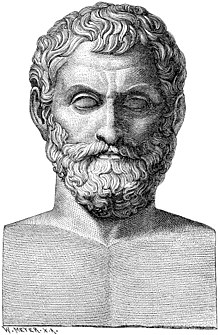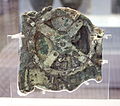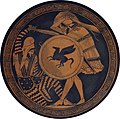
Back بوابة:اليونان القديمة Arabic Portal:Qədim Yunanıstan Azerbaijani Партал:Старажытная Грэцыя Byelorussian Portal:Griechische Antike German Πύλη:Αρχαία Ελλάδα Greek Portal:Antigua Grecia Spanish Portail:Grèce antique French Portal:Grecia antiga Galician פורטל:יוון העתיקה HE Պորտալ:Հին Հունաստան Armenian
The Ancient Greece Portal

Ancient Greece (Ancient Greek: Ἑλλάς, romanized: Hellás) was a northeastern Mediterranean civilization, existing from the Greek Dark Ages of the 12th–9th centuries BC to the end of classical antiquity (c. 600 AD), that comprised a loose collection of culturally and linguistically related city-states and other territories. Most of these regions were officially unified only once, for 13 years, under Alexander the Great's empire from 336 to 323 BC. In Western history, the era of classical antiquity was immediately followed by the Early Middle Ages and the Byzantine period.
Three centuries after the Late Bronze Age collapse of Mycenaean Greece, Greek urban poleis began to form in the 8th century BC, ushering in the Archaic period and the colonization of the Mediterranean Basin. This was followed by the age of Classical Greece, from the Greco-Persian Wars to the 5th to 4th centuries BC, and which included the Golden Age of Athens. The conquests of Alexander the Great spread Hellenistic civilization from the western Mediterranean to Central Asia. The Hellenistic period ended with the conquest of the eastern Mediterranean world by the Roman Republic, and the annexation of the Roman province of Macedonia in Roman Greece, and later the province of Achaea during the Roman Empire.
Classical Greek culture, especially philosophy, had a powerful influence on ancient Rome, which carried a version of it throughout the Mediterranean and much of Europe. For this reason, Classical Greece is generally considered the cradle of Western civilization, the seminal culture from which the modern West derives many of its founding archetypes and ideas in politics, philosophy, science, and art. (Full article...)
Selected article -

The first government of ancient Macedonia was established by the Argead dynasty of Macedonian kings during the Archaic period (8th–5th centuries BC). The early history of the ancient kingdom of Macedonia is obscure because of shortcomings in the historical record; little is known of governmental institutions before the reign of Philip II during the late Classical period (480–336 BC). These bureaucratic organizations evolved in complexity under his successor Alexander the Great and the subsequent Antipatrid and Antigonid dynasties of Hellenistic Greece (336–146 BC). Following the Roman victory in the Third Macedonian War over Perseus of Macedon in 168 BC, the Macedonian monarchy was abolished and replaced by four client state republics. After a brief revival of the monarchy in 150–148 BC, the Fourth Macedonian War resulted in another Roman victory and the establishment of the Roman province of Macedonia.
It is unclear if there was a formally established constitution dictating the laws, organization, and divisions of power in ancient Macedonia's government, although some tangential evidence suggests this. The king (basileus) served as the head of state and was assisted by his noble companions and royal pages. Kings served as the chief judges of the kingdom, although little is known about Macedonia's judiciary. The kings were also expected to serve as high priests of the nation, using their wealth to sponsor various religious cults. The Macedonian kings had command over certain natural resources such as gold from mining and timber from logging. The right to mint gold, silver, and bronze coins was shared by the central and local governments. (Full article...)Selected location -
The Acropolis of Athens (Ancient Greek: ἡ Ἀκρόπολις τῶν Ἀθηνῶν, romanized: hē Akropolis tōn Athēnōn; Modern Greek: Ακρόπολη Αθηνών, romanized: Akrópoli Athinón) is an ancient citadel located on a rocky outcrop above the city of Athens, Greece, and contains the remains of several ancient buildings of great architectural and historical significance, the most famous being the Parthenon. The word Acropolis is from the Greek words ἄκρον (akron, "highest point, extremity") and πόλις (polis, "city"). The term acropolis is generic and there are many other acropoleis in Greece. During ancient times the Acropolis of Athens was also more properly known as Cecropia, after the legendary serpent-man Cecrops, the supposed first Athenian king.
While there is evidence that the hill was inhabited as early as the fourth millennium BC, it was Pericles (c. 495–429 BC) in the fifth century BC who coordinated the construction of the buildings whose present remains are the site's most important ones, including the Parthenon, the Propylaea, the Erechtheion and the Temple of Athena Nike. The Parthenon and the other buildings were seriously damaged during the 1687 siege by the Venetians during the Morean War when gunpowder being stored by the then Turkish rulers in the Parthenon was hit by a Venetian bombardment and exploded. (Full article...)Did you know...
- ... that the Greeks did not have a term for "religion"?
- ... that Ancient Greek cuisine was characterized by its frugality, reflecting agricultural hardship?
- ... that the economy of ancient Greece was characterized by the extreme importance of agriculture, all the more so because of the relative poverty of Greece's soil?
Related portals
Selected biography -
Thales of Miletus (/ˈθeɪliːz/ THAY-leez; Greek: Θαλῆς; c. 626/623 – c. 548/545 BC) was an Ancient Greek pre-Socratic philosopher from Miletus in Ionia, Asia Minor. Thales was one of the Seven Sages, founding figures of Ancient Greece.
Many regard him as the first philosopher in the Greek tradition, breaking from the prior use of mythology to explain the world and instead using natural philosophy. He is thus otherwise referred to as the first to have engaged in mathematics, science, and deductive reasoning. (Full article...)General images -
Selected picture

Photo credit: ?
Ruins of the Ancient Olympic Games training grounds at Olympia.The historical origins of the Ancient Olympic Games are unknown, but several legends and myths have survived. One of these involved Pelops, king of Olympia and eponymous hero of the Peloponnesus, to whom offerings were made during the games.
Topics
Life: Agriculture · Art · Cuisine · Democracy · Economy · Language · Law · Medicine · Paideia · Pederasty · Pottery · Prostitution · Slavery · Technology · Olympic Games
Philosophers: Pythagoras · Heraclitus · Parmenides · Protagoras · Empedocles · Democritus · Socrates · Plato · Aristotle · Zeno · Epicurus
Authors: Homer · Hesiod · Pindar · Sappho · Aeschylus · Sophocles · Euripides · Aristophanes · Menander · Herodotus · Thucydides · Xenophon · Plutarch · Lucian · Polybius · Aesop
Buildings: Parthenon · Temple of Artemis · Acropolis · Ancient Agora · Arch of Hadrian · Temple of Zeus at Olympia · Colossus of Rhodes · Temple of Hephaestus · Samothrace temple complex
Chronology: Aegean civilization · Minoan Civilization · Mycenaean civilization · Greek dark ages · Classical Greece · Hellenistic Greece · Roman Greece
People of Note: Alexander The Great · Lycurgus · Pericles · Alcibiades · Demosthenes · Themistocles · Archimedes · Hippocrates
Art and Sculpture: Kouroi · Korai · Kritios Boy · Doryphoros · Statue of Zeus · Discobolos · Aphrodite of Knidos · Laocoön · Phidias · Euphronios · Polykleitos · Myron · Parthenon Frieze · Praxiteles
Subcategories
Things to do
 |
Here are some tasks awaiting attention:
|
Associated Wikimedia
The following Wikimedia Foundation sister projects provide more on this subject:
-
Commons
Free media repository -
Wikibooks
Free textbooks and manuals -
Wikidata
Free knowledge base -
Wikinews
Free-content news -
Wikiquote
Collection of quotations -
Wikisource
Free-content library -
Wikiversity
Free learning tools -
Wiktionary
Dictionary and thesaurus
© MMXXIII Rich X Search. We shall prevail. All rights reserved. Rich X Search






















































